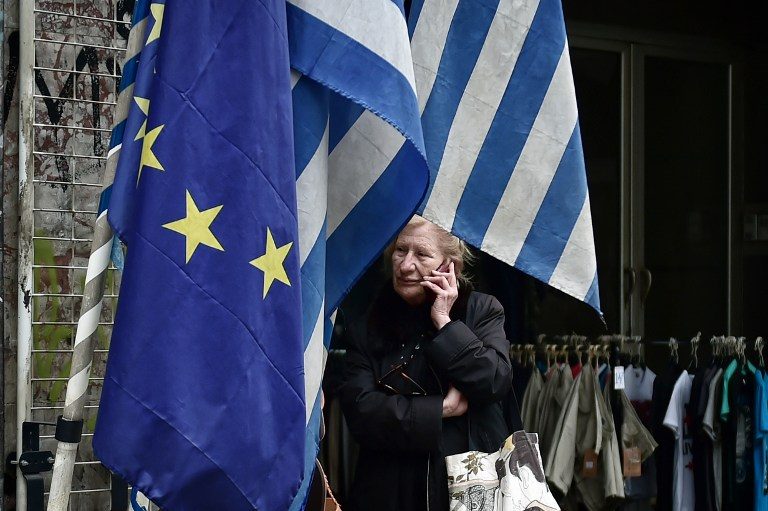SUMMARY
This is AI generated summarization, which may have errors. For context, always refer to the full article.

ATHENS, Greece (3rd UPDATE) – Greece and its creditors on Tuesday, May 2, closed a troubled chapter on fiscal reforms with a preliminary deal on pension and tax cuts, offering hope for a debt relief agreement later this month.
“This is a balanced and viable agreement,” government spokesman Dimitris Tzanakopoulos told reporters, hours after all-night negotiations with the senior representatives of the European Union, the European Central Bank and the International Monetary Fund.
“The Greek government’s central goal is to reach an overall agreement on May 22 that also specifies midterm debt (relief) measures ,” he added.
“This will open the way for Greece to regain access to (bond) markets,” the spokesman said.
Finance Minister Euclid Tsakalotos said a “preliminary technical agreement” had been achieved ahead of a May 22 meeting of eurozone finance ministers, which is required to rubber-stamp the deal.
In Brussels, a spokesman for European economy commissioner Pierre Moscovici said the provisional agreement “is a very positive development following months of complex negotiations.”
“It is now for all partners to reach an understanding on the question of Greece’s debt in the coming weeks,” Moscovici’s spokesman said.
Tsakalotos added he was certain that the agreement would enable Greece to secure debt relief measures from its creditors, which he has said is vital to spearhead recovery in the country’s struggling economy.
“There is no excuse of lack of agreement” in the talks, the Greek minister said.
A compromise is required to unblock a tranche of loans Greece needs to repay seven billion euros ($7.6 billion) in maturing loans in July.
In a joint statement, the creditors said Tuesday’s agreement “will be the basis” for an overall review of Greece’s economic performance and “will now be complemented by further discussions in the coming weeks on a credible strategy for ensuring that Greece’s debt is sustainable.”
To clinch the deal, the government agreed earlier this month to adopt another 3.6 billion euros ($3.8 billion) in spending cuts in 2019 and 2020.
Athens conceded fresh pension and tax break cuts in return for permission to spend an equivalent sum on poverty relief measures.
Tzanakopoulos on Tuesday said pensions are to be cut by 9% across the board, while tax-free income will be slashed by around a third on average.
At the final meeting, Greece also agreed to sell up to 40% of state electricity provider PPC’s coal mines, reports said.
The measures are to be approved by parliament after May 16, the spokesman said.
Prime Minister Alexis Tsipras has said he will not apply these cuts without a clear pledge later this month on debt-easing measures for Greece.
General strike
The nation’s debt in 2016 stood at nearly 315 billion euros or 179% of annual economic output, up from 177.4% in 2015.
“Debt relief will be needed to find a solution,” Eurogroup head Jeroen Dijsselbloem said last week.
Athens also hopes to be finally allowed access to the European Central Bank’s asset purchase program, known as quantitative easing, or QE, to help its return to bond markets.
Over 10,000 people demonstrated against the cuts on Monday, and a general strike is to be held on May 17.
Greece and its creditors agreed a third, 86-billion-euro ($94-billion) bailout deal in July 2015.
But the IMF has so far refused to take part on the grounds that the targets were unrealistic and Athens’ debt mountain unsustainable.
Additional debt relief for Greece has proved a contentious point for many of its European creditors including Germany, where additional concessions are unpopular with a general election looming in September.
In an interview Sunday, German Finance Minister Wolfgang Schaeuble said a May 22 deal was feasible “if the (Greek) government respects all the agreements”.
“Greece has made progress, the last figures are positive. But the government has not yet fulfilled all the agreements,” he said. – Rappler.com
Add a comment
How does this make you feel?
There are no comments yet. Add your comment to start the conversation.